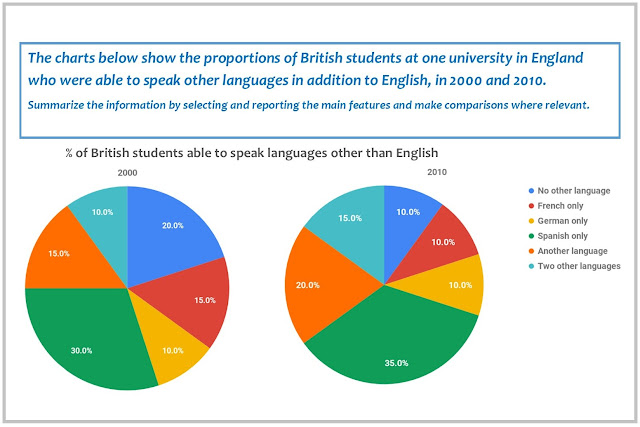8 professional growth ideas for English teachers
1. Language exams: IELTS, TOEFL, C1 Advanced / C2 Proficiency
I am one of those teachers who take international exams on a regular basis. Taking international exams is a great way to grow for several reasons.
First, you get an objective assessment of your language level. Sadly, our level is not always as high as we think it is, and some skills might be lacking. Language exams paint a clear picture. If you are aware of your weaknesses, exams are a good improvement tool because they force you to work towards a measurable, time-bound goal. Even if your English is impeccable, exam preparation is still useful because it never hurts to brush up on your skills.
Last but not least, you can expand your teaching horizons and get your feet wet in teaching exam preparation courses.
You have to exercise caution though when you choose a school. I’ve taken two such courses myself. One was OK, but one was a disaster. Here are two schools in the UK where excellent quality is beyond doubt: Lexical Lab (where the courses are taught by Hugh Dellar and Andrew Walkley themselves) and NILE (with a wide variety of courses to meet every teaching need).
ELT events are a great idea because you learn from experienced colleagues who teach day in day out and meet like-minded people. Many webinars from publishers are held by course book authors themselves! Plus, these events are less time-consuming or pricey compared to my suggestions in #2 and #3.
One huge benefit of taking a MOOC is a schedule. Studying on your own with no deadlines or supervision, you are less likely to persevere. I also love the variety. You can take a course on any topic you or your students are interested in and develop your skills in different directions.
When I take MOOCs, I make sure they are not related to teaching. Here are some courses I have enrolled in:
Participating in international programs can be described as life-changing, eye-opening, and mind-blowing. These adjectives are not enough, but they give you a vague idea.
I’ve written extensively about my Fulbright FLTA experience. Here are some posts in case you missed them:
Last but not least, you can expand your teaching horizons and get your feet wet in teaching exam preparation courses.
2. Teaching: CELTA / DELTA, CertTESOL / DipTESOL
If you want to enhance your teaching skills, why not do an internationally recognized course? Not only will you get an internationally recognized qualification, but you will also learn solid, up-to-date teaching practices that work. These courses are a great idea for people who don’t have a degree in teaching or who got their degree a long time ago.3. Short courses in an English-speaking country
If #2 courses seem too time-consuming and demanding at the moment, you can go for 1-2 week courses in the UK or Ireland. One definite plus of such courses is that you are immersed in a 100% authentic English-speaking environment 24/7, so you can learn from teachers and everyday situations.You have to exercise caution though when you choose a school. I’ve taken two such courses myself. One was OK, but one was a disaster. Here are two schools in the UK where excellent quality is beyond doubt: Lexical Lab (where the courses are taught by Hugh Dellar and Andrew Walkley themselves) and NILE (with a wide variety of courses to meet every teaching need).
4. In Russia: ELT conferences / summer schools / webinars
If you can’t or don’t want to travel, there is something you can do in your home country. In Russia, ELT events are organized by local ELT communities and international publishing companies. Follow Macmillan, Pearson, Cambridge University Press, Oxford University Press, and your local communities on social media to stay informed. Publishers usually have an international and a local ELT division. Follow both.ELT events are a great idea because you learn from experienced colleagues who teach day in day out and meet like-minded people. Many webinars from publishers are held by course book authors themselves! Plus, these events are less time-consuming or pricey compared to my suggestions in #2 and #3.
5. MOOCs: Coursera, Edx, Futurelearn
MOOCs are massive open online courses taught by the world’s leading universities on three most popular platforms: coursera.org, edx.org, futurelearn.com. You can take them on an audit basis or pursue a certificate. Most courses are free or reasonably priced.One huge benefit of taking a MOOC is a schedule. Studying on your own with no deadlines or supervision, you are less likely to persevere. I also love the variety. You can take a course on any topic you or your students are interested in and develop your skills in different directions.
When I take MOOCs, I make sure they are not related to teaching. Here are some courses I have enrolled in:
- “What is news?”
- “Introduction to Public Speaking”
- “Think again: How to reason and argue”
- “Business communications”
- “Resume, Networking, and Interview Skills.”
6. Grants and scholarships
When I think of grants and scholarships, two biggest and most reliable programs come to mind: Chevening (British) and Fulbright (American). Chevening provides fully-funded scholarships to pursue a one-year master’s degree in any subject at any UK university. Fulbright offers a range of programs at American universities.Participating in international programs can be described as life-changing, eye-opening, and mind-blowing. These adjectives are not enough, but they give you a vague idea.
I’ve written extensively about my Fulbright FLTA experience. Here are some posts in case you missed them:
7. Think outside the box
Professional growth ideas are not necessarily courses that have the word ‘teaching’ or ‘English’ in them. You can leave room for serendipity and follow your curiosity. I can’t really give clear-cut instructions here, but I can give an example.
I love Dublin. I’ve been several times. With a little help from the universe, I discovered two places that don’t run courses specifically for EFL teachers but do run courses EFL teachers are bound to benefit from. The first one is Irish Writers Center, which offers a range of courses on creative writing, travel writing, blogging, poetry, editing and more. Curiously, the center also hosts creative writing meetings for non-native speakers! The second place is Griffith College, the scrutiny of whose website revealed 2-day Public Speaking courses.
Think outside the box and recognize opportunities in disguise.
The first one is this blog. Each post is read by hundreds of people from all over the world, so to save myself from public embarrassment, I do my best writing it. I look for better sentence structures, I edit, I check and double-check all my language. As a result, I practise my writing skills and brush up on my vocabulary. The second example is a private speaking club my colleague and I started. I’ve been practising my speaking skills for free for almost two years now. Find out more in this post.
Both of these ideas can be implemented in the privacy of your home, in your pajamas, with zero financial investment and on a very flexible schedule.
Albert Einstein said, “Life is like riding a bicycle. In order to keep your balance, you must keep moving.” Teaching is also like riding a bicycle. In order to keep providing a good service to our students and to keep enjoying it, we must keep moving. The opportunities are there. Choose the ones to your liking and just do it!
Do you have more ideas? Share in the comments.
I love Dublin. I’ve been several times. With a little help from the universe, I discovered two places that don’t run courses specifically for EFL teachers but do run courses EFL teachers are bound to benefit from. The first one is Irish Writers Center, which offers a range of courses on creative writing, travel writing, blogging, poetry, editing and more. Curiously, the center also hosts creative writing meetings for non-native speakers! The second place is Griffith College, the scrutiny of whose website revealed 2-day Public Speaking courses.
Think outside the box and recognize opportunities in disguise.
8. Be your own source of growth
Again, I can’t give you clear-cut instructions. I can only give you examples.The first one is this blog. Each post is read by hundreds of people from all over the world, so to save myself from public embarrassment, I do my best writing it. I look for better sentence structures, I edit, I check and double-check all my language. As a result, I practise my writing skills and brush up on my vocabulary. The second example is a private speaking club my colleague and I started. I’ve been practising my speaking skills for free for almost two years now. Find out more in this post.
Both of these ideas can be implemented in the privacy of your home, in your pajamas, with zero financial investment and on a very flexible schedule.
Albert Einstein said, “Life is like riding a bicycle. In order to keep your balance, you must keep moving.” Teaching is also like riding a bicycle. In order to keep providing a good service to our students and to keep enjoying it, we must keep moving. The opportunities are there. Choose the ones to your liking and just do it!
Do you have more ideas? Share in the comments.





Comments
Post a Comment